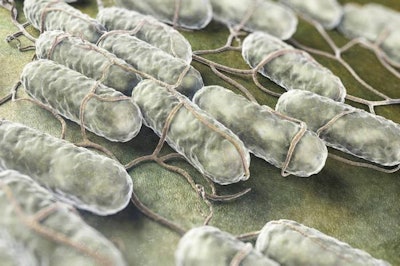
Salmonella is a nasty organism and a bane to pets and people alike. Virtually ubiquitous in the environment, with more than 2,200 strains, it can contaminate all sorts of substances, including pet food and human food.
A recent study examining Salmonella outbreaks in human foods from 1998-2015, for example, showed nearly 2,447 incidences, for a yearly average of 136. As detailed in the July 2019 issue of the Journal of Food Protection and reported by FoodSafetyMagazine.com, these outbreaks caused 65,916 cases of human illness or death; in fact, 87 people died from their infections during that 17-year period. The data was all reported to the U.S. Centers for Disease Control (CDC).
Salmonella in pet food linked to human illness
Though Salmonella can lead to illness in dogs or cats, it’s far more likely to affect humans. The possibility for it to cause severe illness or death in people is the main reason given by the U.S. Food and Drug Administration (FDA) for its zero-tolerance policy for Salmonella in pet food, citing the handling of contaminated pet foods or treats as a significant risk, especially to children, older people or ones with compromised immune systems.
Indeed, a recent investigation by FDA and CDC into a Salmonella outbreak tied to possibly contaminated bulk pig ear treats led to a recall by the retailer stocking them, Pet Supplies Plus. At the time of the recall in early July 2019, 45 human illnesses from Salmonella had been linked to the treats, though they had not been confirmed as the source of contamination. Just two weeks later, the number had increased to 93, with 48 cases reported just since July 3, 2019.
Past is prologue for current Salmonella outbreaks
Interestingly, an article on CNN about the pig ear treats included information on another recent outbreak of Salmonella, this one tied to backyard chickens. In the Journal of Food Protection study, eggs and chickens were the foods most frequently implicated in the 1998-2015 instances, at 12.5% and 12.4%, respectively. While I presume those chicken-related cases came from people eating or handling contaminated processed chicken, rather than handling backyard pets as is apparently the source of the current cases, chicken has been and still is a common culprit. The past incidences with eggs could provide another clue to the present, if the backyard chickens in question have produced eggs.
The third most implicated human food in past Salmonella outbreaks? Pork, at 6.5% – yet another tie to the present, in this case to the current cases linked to dog treats.
Huge disconnect between CDC and FDA data, focus
As for a historical comparison of Salmonella outbreaks and salmonellosis cases linked specifically to pet food or treats, CDC’s website includes data from 2006 through this year to date, reporting a total of three incidences: the one in 2019 with the pig ear treats, one in 2012 linked to dry dog food and another in 2007 linked to dry dog food. (There have been several other cases linked to handling of pets such as guinea pigs, turtles and species other than cats and dogs).
Though the years don’t match up exactly with those in the recent study on human food cases, we’re still talking only three outbreaks in 14 years, compared to the more than 2,400 linked to human food in a 17-year period. Yet since passage of the Food and Safety Modernization Act (FSMA) in 2011, FDA has continued to target pet food for potential Salmonella contamination, often leading to recalls whether or not pathogens have been found in actual products for sale. FDA’s safety portal shows 21 recalls of dog or cat food or treats (plus two in food for other species) for suspected Salmonella since the beginning of 2018 alone. Many of these have been with raw pet foods, a frequent and convenient FDA target.
In that same 18-month period, there have been 66 recalls of human food or beverages due to possible Salmonella contamination – a total that makes more sense when you weigh it against the CDC data.
Salmonella is everywhere
No matter how you analyze the numbers, the recent Salmonella outbreaks, especially when considered with the historical data, again confirms the interconnectivity between our pet food and human food systems – as well as the fact that, even with new safety protocols and stricter regulations such as FSMA in place, Salmonella still poses a substantial risk.


















